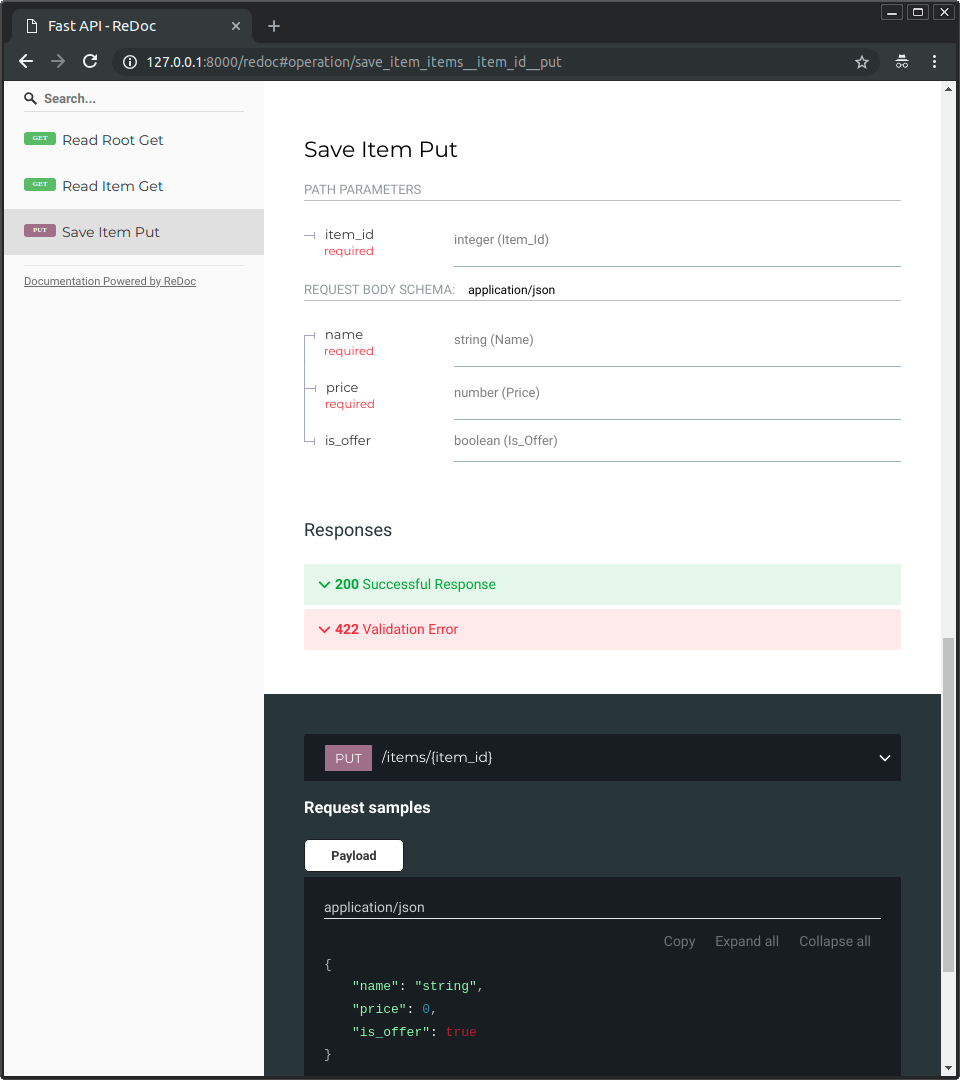- Sort Score
- Result 10 results
- Languages All
Results 31 - 40 of 47 for syntax (0.14 sec)
-
docs/vi/docs/python-types.md
Trong Python 3.6 hoặc lớn hơn (bao gồm Python 3.10) bạn có thể sử dụng kiểu `Union` từ `typing` và đặt trong dấu ngoặc vuông những giá trị được chấp nhận. In Python 3.10 there's also a **new syntax** where you can put the possible types separated by a <abbr title='also called "bitwise or operator", but that meaning is not relevant here'>vertical bar (`|`)</abbr>.
Plain Text - Registered: Sun May 05 07:19:11 GMT 2024 - Last Modified: Thu Apr 18 19:53:19 GMT 2024 - 21.9K bytes - Viewed (0) -
docs/en/docs/index.md
### Recap In summary, you declare **once** the types of parameters, body, etc. as function parameters. You do that with standard modern Python types. You don't have to learn a new syntax, the methods or classes of a specific library, etc. Just standard **Python**. For example, for an `int`: ```Python item_id: int ``` or for a more complex `Item` model: ```Python
Plain Text - Registered: Sun May 05 07:19:11 GMT 2024 - Last Modified: Thu May 02 22:37:31 GMT 2024 - 19.8K bytes - Viewed (0) -
docs/tr/docs/alternatives.md
Böylece Flask-apispec, Python döküman dizilerine YAML gibi farklı bir syntax yazma sorununu çözmüş oldu. **FastAPI**'ı geliştirene dek benim favori arka uç kombinasyonum Flask'in yanında Marshmallow ve Webargs ile birlikte Flask-apispec idi.
Plain Text - Registered: Sun May 05 07:19:11 GMT 2024 - Last Modified: Fri Mar 22 01:42:11 GMT 2024 - 28.8K bytes - Viewed (0) -
docs/de/docs/index.md
### Zusammenfassung Zusammengefasst deklarieren Sie **einmal** die Typen von Parametern, Body, etc. als Funktionsparameter. Das machen Sie mit modernen Standard-Python-Typen. Sie müssen keine neue Syntax, Methoden oder Klassen einer bestimmten Bibliothek usw. lernen. Nur Standard-**Python+**. Zum Beispiel für ein `int`: ```Python item_id: int ``` oder für ein komplexeres `Item`-Modell:
Plain Text - Registered: Sun May 05 07:19:11 GMT 2024 - Last Modified: Mon Apr 29 05:18:04 GMT 2024 - 21.1K bytes - Viewed (0) -
docs/fa/docs/index.md
به طور خلاصه شما **یک بار** انواع پارامترها، بدنه و غیره را به عنوان پارامترهای ورودی تابع خود تعریف میکنید. این کار را با استفاده از انواع استاندارد و مدرن موجود در پایتون انجام میدهید. نیازی به یادگیری <abbr title="Syntax">نحو</abbr> جدید یا متدها و کلاسهای یک کتابخانه بخصوص و غیره نیست. تنها **پایتون +۳.۶**. به عنوان مثال برای یک پارامتر از نوع `int`: ```Python item_id: int ```
Plain Text - Registered: Sun May 05 07:19:11 GMT 2024 - Last Modified: Thu Apr 18 23:58:47 GMT 2024 - 25.9K bytes - Viewed (0) -
docs/en/docs/tutorial/sql-databases.md
Plain Text - Registered: Sun May 05 07:19:11 GMT 2024 - Last Modified: Thu Apr 18 19:53:19 GMT 2024 - 29.6K bytes - Viewed (0) -
docs/fr/docs/features.md
Tout intégration est conçue pour être si simple à utiliser (avec des dépendances) que vous pouvez créer un "plug-in" pour votre application en deux lignes de code utilisant la même syntaxe que celle de vos *path operations* ### Testé * 100% <abbr title="La quantité de code qui est testé automatiquement">de couverture de test</abbr>.
Plain Text - Registered: Sun May 05 07:19:11 GMT 2024 - Last Modified: Thu Apr 18 19:53:19 GMT 2024 - 11.1K bytes - Viewed (0) -
docs/pt/docs/features.md
 ### Apenas Python moderno Tudo é baseado no padrão das declarações de **tipos do Python 3.8** (graças ao Pydantic). Nenhuma sintaxe nova para aprender. Apenas o padrão moderno do Python.
Plain Text - Registered: Sun May 05 07:19:11 GMT 2024 - Last Modified: Thu Apr 18 19:53:19 GMT 2024 - 10.4K bytes - Viewed (0) -
docs/pt/docs/tutorial/path-params.md
# Parâmetros da rota da URL Você pode declarar os "parâmetros" ou "variáveis" com a mesma sintaxe utilizada pelo formato de strings do Python: ```Python hl_lines="6-7" {!../../../docs_src/path_params/tutorial001.py!} ``` O valor do parâmetro que foi passado à `item_id` será passado para a sua função como o argumento `item_id`.
Plain Text - Registered: Sun May 05 07:19:11 GMT 2024 - Last Modified: Thu Apr 18 19:53:19 GMT 2024 - 9.7K bytes - Viewed (0) -
docs/pt/docs/tutorial/first-steps.md
* a rota `/` * usando o <abbr title="o método HTTP GET">operador <code>get</code></abbr> !!! info "`@decorador`" Essa sintaxe `@alguma_coisa` em Python é chamada de "decorador". Você o coloca em cima de uma função. Como um chapéu decorativo (acho que é daí que vem o termo). Um "decorador" pega a função abaixo e faz algo com ela.
Plain Text - Registered: Sun May 05 07:19:11 GMT 2024 - Last Modified: Thu Apr 18 19:53:19 GMT 2024 - 9.6K bytes - Viewed (0)